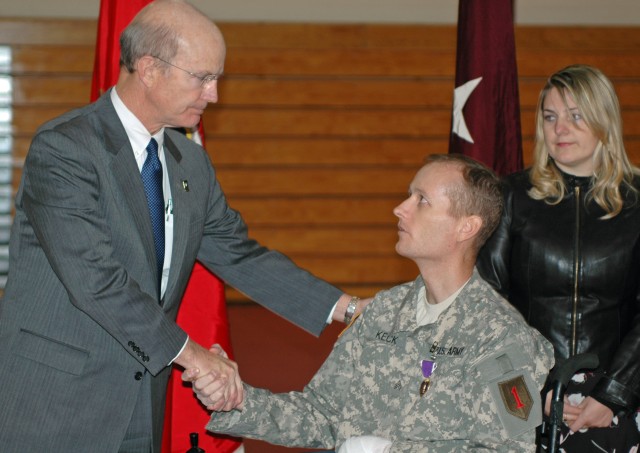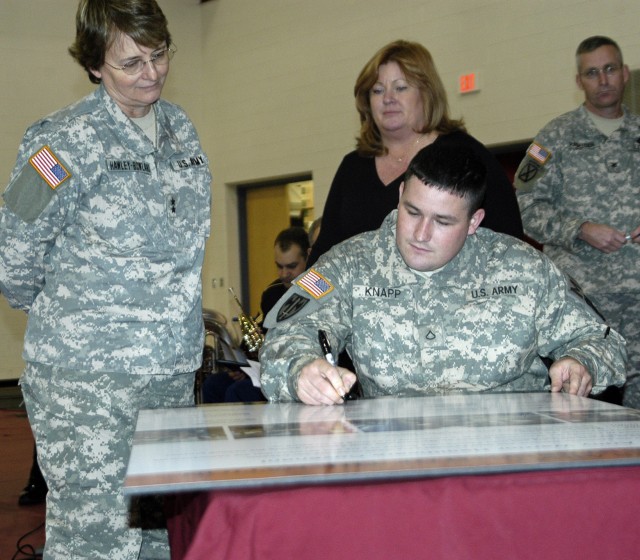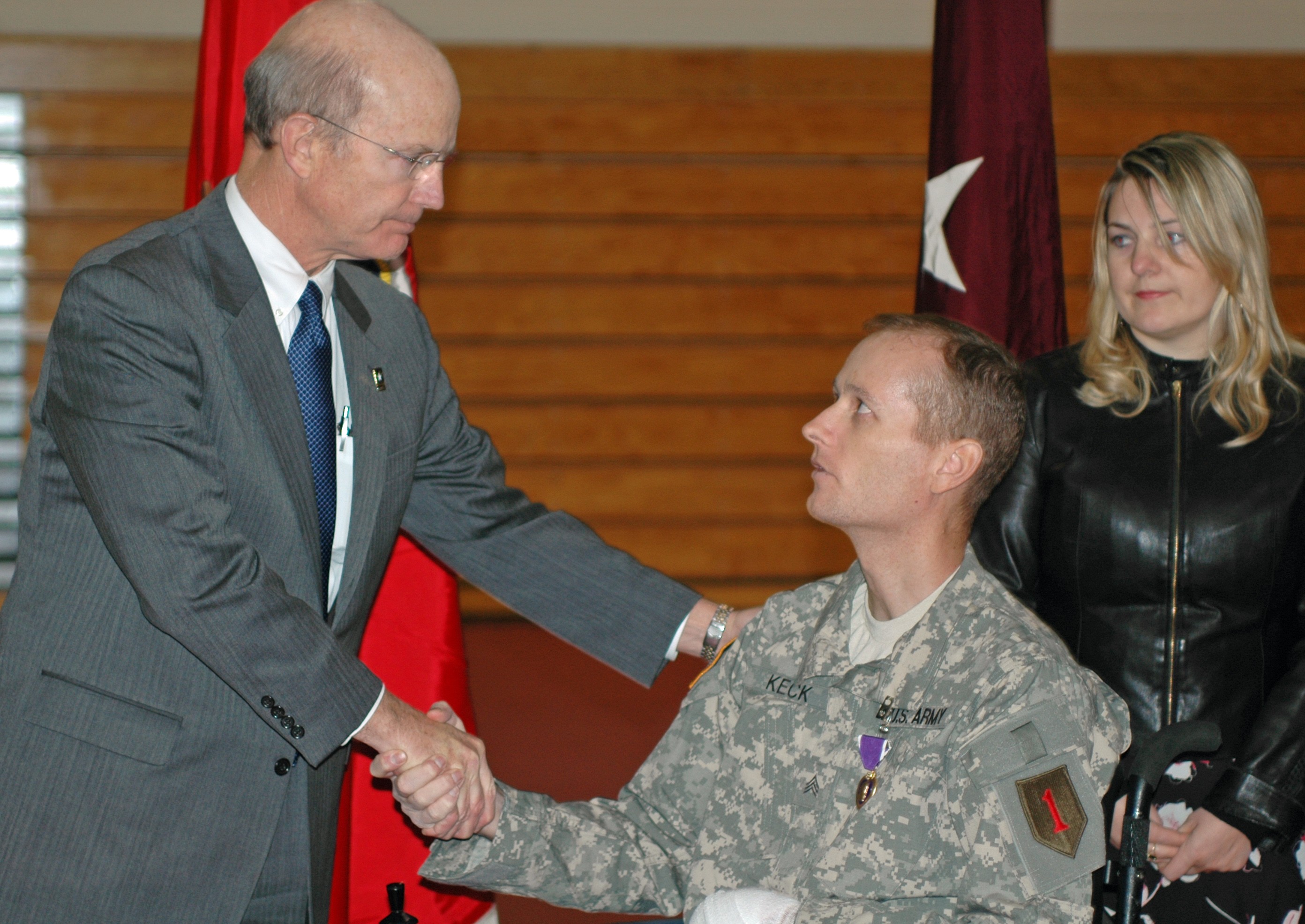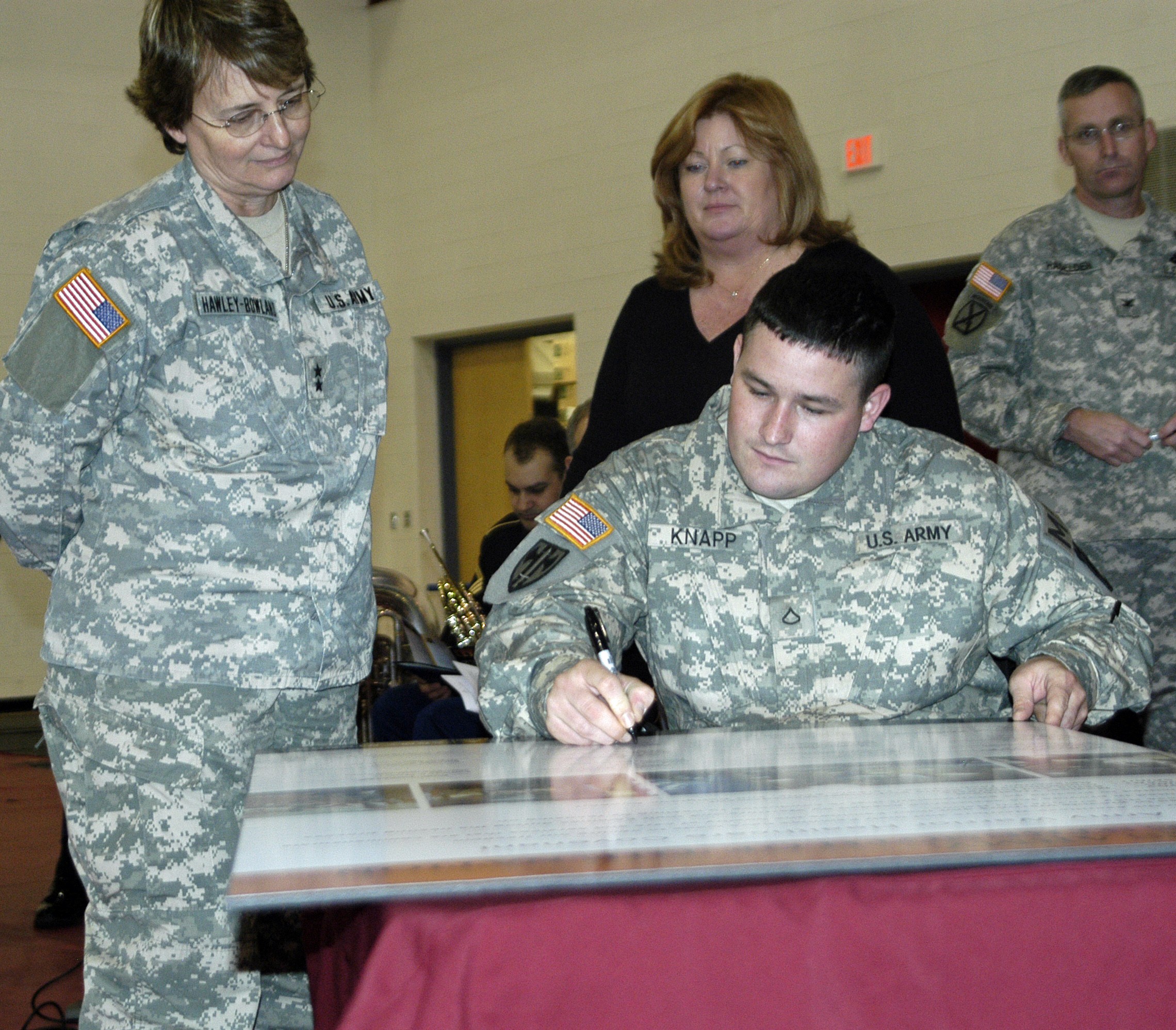WASHINGTON (Army News Service, Nov. 18, 2008) - Army Service Day and Warrior Care Month activities Monday began with the signing of a Warrior Healthcare Covenant at Walter Reed Army Medical Center.
Army and Walter Reed leaders signed the covenant, committing to provide warriors and their families with quality care, assistance, and a healing environment "focusing on body, mind, heart and spirit." Warrior in Transition Pfc. David Knapp and his mother also signed the covenant.
The covenant signing preceded a town hall meeting at Walter Reed in which Army Surgeon General Lt. Gen. Eric B. Schoomaker fielded questions from warriors and their families. Following the meeting, Secretary of the Army Pete Geren presented three Purple Hearts and a Bronze Star medal.
"I thank the Soldiers and your families who stand shoulder to shoulder with you for your service to our nation," Geren said. "I pledge we will provide the medical care and support that all wounded warriors and their families need."
Purple Heart recipient Sgt. Kelly Keck, a combat medic assigned to Headquarters Company, 3rd Support Troops Battalion, 1st Infantry Division at Fort Hood, Texas, was injured by a land mine while on a mounted combat patrol near Forward Operating Base Lone Star, Afghanistan.
"I was in the right spot at the wrong time," said Keck. "But I'm glad to have served my country and receive the Purple Heart."
Keck was joined by his family members who accompanied him during the ceremony.
Other Purple Heart recipients included Sgt. Gabriel Green, a team leader assigned to Chosen Company, 2nd Battalion, 503rd Infantry, 173rd Airborne Brigade Combat Team in Vicenza, Italy. Green was injured in a mortar attack while manning an observation post in Kunar Province, Afghanistan.
Sgt. Justin Smith, a team leader assigned to 1st Platoon, Bravo Company, 70th Engineer Company at Fort Riley, Kan., was injured by an improvised explosive device while conducting route clearance operations in Paktika Province, Afghanistan. Smith was also awarded the Bronze Star for "exceptional meritorious service" in support of Operation Enduring Freedom in Afghanistan.
Geren took the opportunity to highlight how advances in military medicine have improved combat survivability, ensuring more Soldiers make it home alive.
"The Army continues to provide world-class care to our Soldiers and their families," said Geren, emphasizing improvements in battlefield care since past wars. He said that today, moe than 90 percent of those wounded in battle survive.
"Army medicine is the best in the world," Geren said. He listed advancements in amputee care, development of prosthesis, delivery of trauma and emergency care, and treatment of post traumatic stress disorder and "other invisible wounds."
Geren also praised Warrior Transition Units in seeing that wounded warriors are provided more comprehensive care; the Army Wounded Warrior project; DoD's "close work daily" with the Department of Veterans Affairs to provide a "seamless" transition of care; and the help of volunteer support organizations.
Maj. Gen. Carla G. Hawley-Bowland, commanding general of the North Atlantic Regional Medical Command and Walter Reed, spoke to several hundred Soldiers about the status of Army medicine.
"We've added many new services to help each wounded or injured Soldier, his or her family, and to help them understand the complex processes for rehabilitation, medical and physical evaluation, and subsequent return to duty, or return to productive civilian life," she said.
The Army now has 36 Warrior Transition Units and Soldier Family Assistance Centers worldwide, Hawley-Bowland said. She also took an opportunity to talk about warrior care efforts at Walter Reed.
"Healthcare is a team effort," she said. "It takes a village, our village -- this Walter Reed village. Army Medical staff at Walter Reed here have treated over 10,000 Operation Iraqi Freedom and Operation Enduring Freedom veterans since 2002."
Army officials were also able to join Warrior Transition Unit leaders and Walter Reed leadership on a tour of the WTU barracks, Soldier Family Assistance Center and Military Advanced Training Center.
(Bernard Little is the Command Information Officer at Walter Reed and Isidro Reyna is currently an intern correspondent with the Army News Service.)




Social Sharing